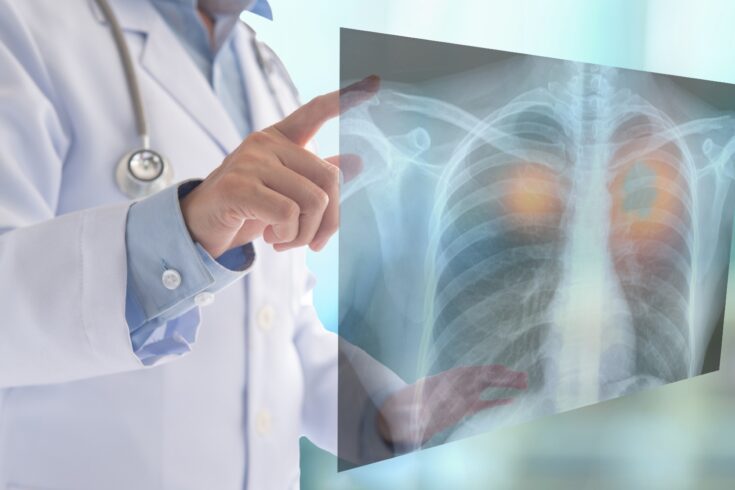Ground-breaking medical research will find new ways to diagnose lung cancer earlier and save lives, thanks to approximately £3.5 million-worth of funding from UK Research and Innovation (UKRI).
The universities of Southampton and Leeds have joined forces with healthcare, diagnostics and informatics companies to detect cancers at a stage when they can still be cured. This links to the NHS England Lung Health Checks programme.
The project, iDx-LUNG, is part of the UKRI data to early diagnosis challenge. It is funded by the Industrial Strategy Challenge Fund and has attracted £10 million of funding in total.
AI for better diagnoses
It’s one of seven projects, focusing on cancer, liver and bowel health, which will use artificial intelligence (AI). AI will bring together data so clinicians can make more accurate and earlier diagnoses and recommend more precise treatments.
This will lead to fewer deaths and long-term health problems among those affected. The projects involve partners from across the UK, including Northern Ireland and Scotland.
Lung cancer is the biggest cause of cancer death in the UK and worldwide. In the UK, 25,000 people are diagnosed with advanced, inoperable lung cancer every year.
Improved testing
As well as targeting increased survival rates, the project will improve testing in people at high risk of cancer.
The best current method of checking lung health, CT scanning, is resource-intense and expensive – diagnosis and treatment of lung cancer currently costs the NHS £307 million every year.
This project will ask 15,000 people who attend NHS England lung health checks at mobile CT scanners in Hampshire and Yorkshire to give blood samples and nasal swabs for testing.
The samples will be analysed for changes that could indicate early cancer development. The tests have never been used in combination or with CT scanning.
Detecting lung cancer earlier
Collaborators in iDx-LUNG include:
- Lung Cancer Initiative at Johnson & Johnson
- Roche
- Oncimmune
- Inivata
- BC Platforms and others.
Peter Johnson, Professor of Medical Oncology at the University of Southampton, who is leading the project, said:
We urgently need to find ways to detect lung cancer early, to drive up people’s chances of a cure. This unique collaborative effort between universities, the NHS and companies with ground-breaking technologies is aimed at doing just that.
Alison Cave, UKRI Challenge Director, said:
iDx-LUNG is a perfect example of the sorts of projects we’re funding under the data to early diagnosis challenge. The projects will combine genomic, tissue analysis and other data, so that we can detect and diagnose disease more accurately and earlier and develop more precise treatments for serious conditions that blight the lives of millions of people across the UK.
Further information
Through this challenge the government will fund industry and research to combine data and real-world evidence from our health service and create new products and services that diagnose diseases earlier and more efficiently.
Up to £210 million will be made available to industry and researchers to improve how we use data to support earlier diagnosis and the development of precision medicine. This includes:
- a large-scale project to sequence the genomes of all 500,000 UK Biobank volunteers. This will provide a data-rich resource and improve understanding of disease processes
- innovating through data funding: the UK has a unique opportunity to draw on multiple health data sets in order to improve insight into disease, the patient experience and outcomes. This fund will support companies to leverage data to develop novel diagnostics and therapies and maximise its value
- centres of excellence: new regional centres of excellence will be created to use digital technologies to advance the analysis of tissue biopsies from patients, make better use of artificial intelligence and machine learning including in imaging techniques such as MRI scans and ultrasound and support the development of diagnostic tools for early diagnosis and patient stratification.
Top image: Credit: utah778/GettyImages

